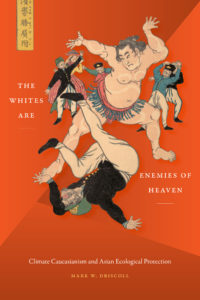Podcast: Play in new window | Download (Duration: 59:00 — 81.0MB)
 Our opening song is “Cherokee” from Count Basie, featuring Buck Clayton, which is, I promise, oddly apropos for a show which centers on narco trafficking in East Asia.
Our opening song is “Cherokee” from Count Basie, featuring Buck Clayton, which is, I promise, oddly apropos for a show which centers on narco trafficking in East Asia.
The music for this program features two men who likely had some measure of influence on each other’s future work: American Jazz Trumpeter Buck Clayton and Chinese scholar, composer and songwriter Li Jinhui.
While the music we’ll hear is far removed from the historical context of today’s show – the period of the Opium Wars in China (or what our guest calls “The Wars for Drugs”) in the mid-19th century – it does seem to me to fairly illustrate the unreliability of official histories (state and corporate propaganda) even as it is demonstrative of hegemonic realities on the ground.
From 1934 or 1935 to 1937, Kansas native, Buck Clayton, was a leader of the jazz group the “Harlem Gentlemen” in Shanghai at the Canidrome Ballroom. Clayton would play a number of songs that were composed by Li Jinhui, adopting the Chinese music scale into the American scale. While there is much to say about this period and about this musical relationship – there is not much time here. One perspective is that Li learned much from Clayton and because of that transculturation came to be known as the “Father of Chinese popular music.” This music came to be considered “Yellow Music” and was classed with pornography as a corrupter of public morals. It was wildly popular.
As there are no recordings of Clayton available to us from this period we’ll play songs from his work with Count Basie from the Original American Decca Collection spanning the years 1937 to 1939. And we’ll hear one song written by Li Jinhui – titled “Drizzle” – sung by his daughter Li Minghui, recorded in 1932.
In his new book, The Whites Are Enemies of Heaven (Duke), Mark Driscoll examines nineteenth-century Western imperialism in Asia and the devastating effects of what he calls “climate caucasianism”—the white West’s pursuit of rapacious extraction at the expense of natural environments and people of color conflated with them.
Driscoll reframes the Opium Wars as “wars for drugs” and demonstrates that these wars to unleash narco- and human traffickers kickstarted the most important event of the Anthropocene: the military substitution of Qing China’s world-leading carbon-neutral economy for an unsustainable Anglo-American capitalism powered by coal.
Today we track US and British drug smugglers like Warren Delano, Jr., the grandfather of US President Franklin Delano Roosevelt. He was a partner in the firm Russell & Company which decorated it’s ship masts in the murdered bodies of Chinese men who refused the opportunity to be business associates. Another partner at Russell & Co, John Murray Forbes, was the great grand Uncle of US Senator John Kerry. And yes, those Forbes. We’ll also travel from Vera Cruz, Mexico to Yokohama, Japan aboard Commodore Matthew Perry’s ship, the Powhatan accompanied by a minstrel troupe. Oh the places white Christian men will go to sell drugs and guns and people.
 GUEST
GUEST
Mark Driscoll, associate professor of East Asian Studies at the University of North Carolina, whose new book is The Whites Are Enemies of Heaven: Climate Caucasianism and Asian Ecological Protection published by Duke University Press.
RELATED
Extra-Acting and Extracting Whiteness: Mark Driscoll
Toulouse-Antonin Roy reviews Mark Driscoll, The Whites are Enemies of Heaven: Climate Caucasianism and Asian Ecological Protection
Black Ships and Samurai by John W. Dower
1932: Li Minghui
MUSIC
Count Basie’s Orchestra (featuring trumpeter Buck Clayton)
“Cherokee” (parts 1 & 2)
“Dark Rapture”
“The Dirty Dozens”
“London Bridge Is Falling Down”
“Drizzle” written by Li Jinhui and sung by his daughter Lin Minghui (1932)
ID music, “Sakura, Sakura” by Hideo Shiraki with 3 Koto Girls
CREDITS
Producer & Host: Doug Storm
Executive Producer: Kade Young
 WFHB Bloomington Community Radio
WFHB Bloomington Community Radio


